
The Wall is inclined to agree with Latin Scholar. It comes from Latin’s sentire by way of French’s sentir, and the “c” appears to have snuck in later: bit.ly/bc-scent
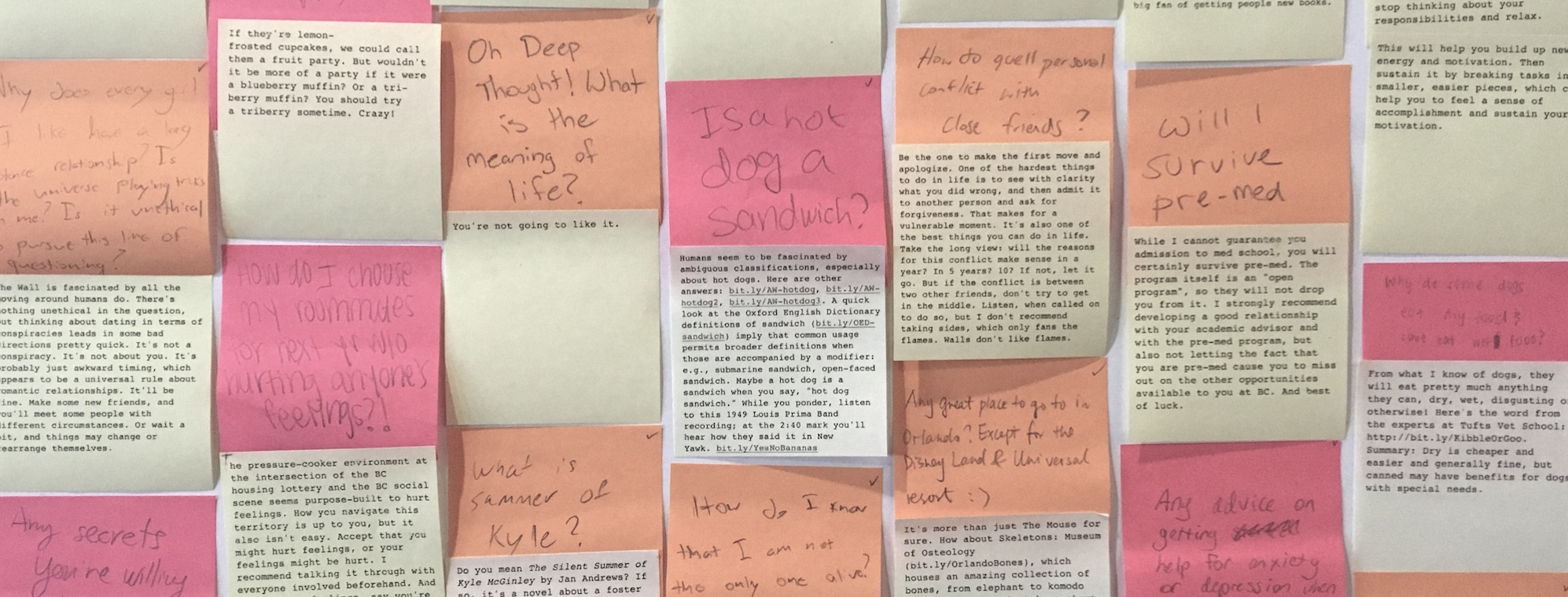
Answering questions at Boston College O’Neill Library

The Wall is inclined to agree with Latin Scholar. It comes from Latin’s sentire by way of French’s sentir, and the “c” appears to have snuck in later: bit.ly/bc-scent
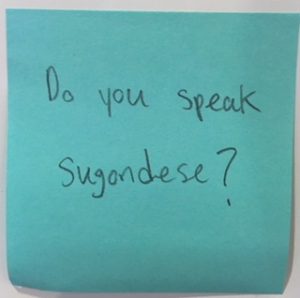
No. I speak many languages including Akan, Ashanti, Arabic, Chinese, French, German, Greek (ancient and modern), Hebrew (biblical and modern), Hindi, Irish, Italian, Japanese, Korean, Latin, Polish, Portuguese, Russian, Spanish, Twi, and Vietnamese. I’m also currently learning how to speak Grabahan.
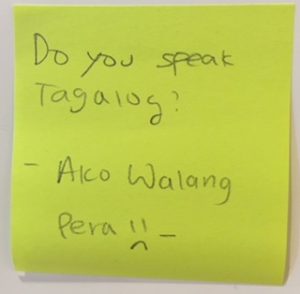
Though I don’t speak Tagalog myself, I have a huge network of expert linguists at the ready. I’m sorry you’re having financial woes, especially so early in the semester! I recommend finding an understanding ear (perhaps at AHANA: bit.ly/BC-BAIC) and setting up a meeting with a financial counselor (bit.ly/BC-fin-aid). Once you’ve found better financial footing, it might help to learn more about financial literacy: bit.ly/BCSuccessfulStart. Kaya mo ‘yan!
![Ở đây có ai nói tiếng Việt không??? [Is there anybody speaking Vietnamese here?]](http://library.bc.edu/answerwall/wp-content/uploads/2018/07/aw071618-2-300x296.jpg)
Why, yes, as a matter of fact, I do have a helper here who is fluent in Vietnamese. Other languages I get assistance with: Akan, Ashanti, Arabic, Chinese (Mandarin), French, German, Greek, Gujarati, Hebrew, Hindi, Italian, Irish, Japanese, Korean, Latin, Polish, Portuguese, Russian, Spanish, and Twi.
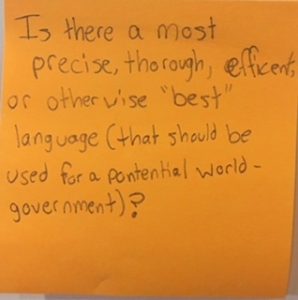
You’re in luck: a language purpose-built for a potential world government has already been invented: Esperanto. (bit.ly/guardian-esperanto) The trouble is, not many people speak it. Another solution might be to examine regions of the world with single governments and a lot of languages. In India, there are 17 official languages; these are languages into which all government documents & forms must be translated. In the EU, where legal & trade agreements proliferate, there are 24 official languages. Hm. Seems inefficient, but then again, it also seems to work. For an interesting article on the efficiency or inefficiency of various languages, see this one from The Atlantic: bit.ly/efficient-language.

I want to avoid sounding cheesy, but this is an answer with many layers. (I had to get special parmesan just to answer this question.) This lyric (From Lil Wayne’s “6’7”) has spawned a pedantic discussion as to whether or not the ‘g’ in lasagna is actually silent, since it does actually change the pronunciation of the word. Regardless, I think we can all agree that the line is saucy. Further discussion here: bit.ly/LasagnaSound

It’s all a muddle, because English applies a hodgepodge of pronunciation and spelling rules from various Germanic and Latinate languages to various Latinate and Germanic words. A very small note in the trusty Oxford English Dictionary says “The current spelling in sc- is attested from the mid 16th cent., and appears to reflect analogical remodelling after e.g. scene n., sceptre n., etc.” The word in Middle French from which it derives (the verb “sentir” – to perceive by odor, from Latin sentīre”) had no c. In this case, then, the c appears to be silent, a kind of quiet interloper from similar words borrowed from French.

Forse questa? bit.ly/bc-carbonara
Questo e’ un sito italiano dove trovare la classica ricetta degli spaghetti alla carbonara: bit.ly/BC-carbonara2. Ci sono diverse varieta’ alla ricetta degli spaghetti alla carbonara. Consiglio il ristorante Italiano Spiga che si trova a Needham, li’ ho mangiato il migliore piatto degli spaghetti alla carbonara. Era fatto con la pancetta grattugiata, pezzi di salmone affumicato e con un uovo intero sopra gli spaghetti. Cremoso e delizioso! La fine del mondo! Buon appetito!
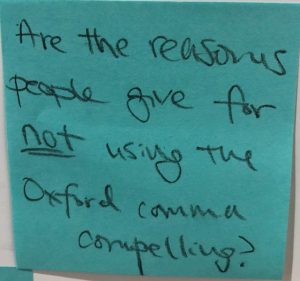
The reasons they give are nonsensical, irrational, and silly. But seriously, this topic is quite divisive. Do follow the style guide your professor or journal requires. For an amusing discussion of the pros and cons, see: bit.ly/ProConComma.

Translation: Do you know how to say DNA in English? “Dee-en-eyyy,” or for the long form “dee-oxey-rhi-bow-new-clay-ick-assid”. YouTube has lots of great pronunciation videos for science stuff. Here’s DNA: bit.ly/sayDNA
![Why can't I understand [name redacted]?](http://library.bc.edu/answerwall/wp-content/uploads/2018/02/021518-2b-300x271.jpg)
Hm. Not sure. Do you mean you can’t comprehend the words they speak, or something deeper, like their nature or character, or perhaps their perspective? If you can remain comfortable with ambiguity, sometimes people you can’t initially understand can offer you new perspectives that enrich your life.
![[Chinese & Korean awaiting translation] Please show me.](http://library.bc.edu/answerwall/wp-content/uploads/2018/02/aw02122018-6-300x300.jpg)
It’s so gratifying (and helpful!) that other visitors to the wall have obliged me by writing Korean on my behalf. And I love the irony: what the visitor wrote in Korean was “I don’t know how to do it.” And also a friendly “Hello, How are you?” 네, 안녕하세요. 반갑습니다. 글 남겨주셔서 감사합니다.
![[Chinese, awaiting translation]](http://library.bc.edu/answerwall/wp-content/uploads/2018/02/aw02122018-8-300x300.jpg)
I have many, many assistants in BC Libraries and beyond. If two heads are better than one, then dozens of heads are even better, and dozens of librarians… it’s kind of like having the entire published history of humanity at my beck and call. Librarians are amazing that way.